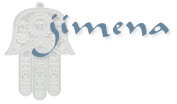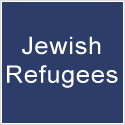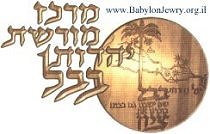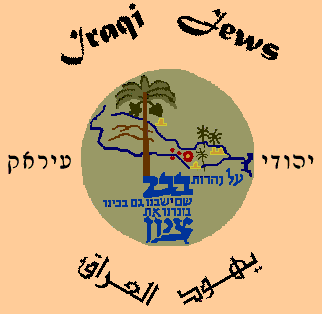Joseph Shoua
Joseph Shoua is part of the generation that remembers Iraq well. He was born in 1927 and did not leave till 1951 at the age of 24.
“You had such a good feeling during the holidays,” he says. “In Iraq we [the Jews] were everyday united.”
The Iraq Shoua remembers was both good and terrible. While he loved the unity of Baghdadi Jews he was also wary of his Arab neighbors.
When Shoua was 14 a group of Muslim boys came up to him and asked him if he was a Muslim. He said that he was. The boys then asked him to say a prayer from the Koran. Shoua tried but failed and the boys beat him up.
But it wasn’t until years later that the hate that he had seen in those three boys would explode on Baghdad’s Jewish community. From a neighbor’s window he saw the street filled with bodies, he says. This was in 1943 during the Farhoud.
He came from a large family; he was the fourth of eight children and very close to his mother. As a young man he worked at his brother-in-law’s electronics’ shop. But when the Jews were expelled he lost his job and his brother-in-law lost his shop. Shoua, like so many others was forced to leave Iraq with only 50 dinars.
Shoua traveled from Iraq to Cyprus with his younger brother and mother; she and Shoua’s father were separated. From Cyprus they went to Haifa. They lived in a tent city for 2 years.
“I didn’t like Israel so much,” Shoua says. “I couldn’t find the work I wanted. I had to work for a bakery. It was twenty hours a day. But I had to provide for my mother. We had to exist so I don’t care.”
After they were moved to pahoneem or an aluminum pre- fabricated house in Holon, just outside of Tel Aviv. Shoua worked as a messenger for a school for mentally retarded children. While he liked the children he wasn’t so keen on the job.
He doesn’t have many fond memories of the camp. Only that there were many Iraqi’s many of whom he had known back home. But he says they didn’t talk much at night that life was dismal.
“We felt like we were just left in the air,” he says. “That’s all we had to talk about.”
But he did find some solace in the Hebrew lesson given at the camp by Shoshana Arbilee who would later become Israel’s Health Minister.
In the years after his family got a house, Shoua worked for the Israeli army in the West Bank. He was in charge of procuring materials for the Arab schools.
“It was okay with the Arabs,” he says. “If you can speak to them in Arabic they think you are from the Koran.”
Shoua spent 15 years in Israel before coming to New York where he worked as a stock boy. By 1972 he was heading west to San Francisco. In the city he opened up two gift shops and retired in 1983.
Since coming to America Shoua has been very active.
When Yasser Arafat said that Jews were descended from monkeys, Shoua wrote a letter to the then PLO leader hiding in Tunisia saying that Arafat was descended from a donkey.
He has written to many Arab leaders; what he calls, “bologna,” to maintain his Arabic. He wrote a poem to Saddamm Hussein saying how he was the king of kings. Hussein’s communication minister wrote a reply thanking Shoua.
He received a thank you letter from the sister of King Abdullah after writing him a letter. He wrote a poem to Hosni Mubarak saying that Mubarak was the Arab world’s greatest leader. A communication officer sent Shoua a thank you note as well.
He laughs about the letters. Those he did for fun.
Two years ago Shoua became angry at the violence in Iraq. He said it was like, “the end of the world.” So he wrote up some fliers in Arabic saying that no such killing is prescribed in the Koran.
He took the fliers to a Mosque and while the patrons prayed, with their face to the wall, he dropped the stack of fliers and ran away.
He does all these things as his little part to help humanity.
“Everybody can change the world,” he says. But he is concerned.
“Even in Israel people go to work and then go home.” They don’t take time to help others. “People need to be responsible,” he says. This is what he finds lamentable. What he lost in that close knit Jewish community in Baghdad.
While he says he hated some of the customs, especially how a woman was forced into a marriage, he thinks that life in Baghdad was better.
“At least a man was a man and a woman was a woman. Today it’s like the woman is the man and the man is the woman.”
And even with the bad memories Shoua says he would go back, as long as there wasn’t the segregation and violence.
“We used to have activities there. We would go to the beach and eat fish until late in the night. You don’t have that here.”
But more than the fish eaten by the river it was a unity that Shoua has never felt anywhere else. Somehow for him it disappeared.
“We were really Jews with blood and skin,” he says.
The self-labeled bachelor at 78 now lives in San Francisco. He recently finished a book in Arabic where he takes on 40 topics, asking the question what is hope, humanity love or 37 others. He hopes it will be published soon.
Egypt Poem:
Suzy Vidal
Slowly flows the river Nile
Sadly beats my heart in exile
The luscious date and mango tree
I surely shall no longer see
I walked along the streets of Cairo
Till that day without a morrow
My friends dispersed all over the globe
In search of a more peaceful abode
We were sent off without a dime
Adieu the country that was mine
The gentle breeze of Sham el Nessim
Has gone with the call of the muezzin
Of jasmine only remains the scent
The Khamsin winds were not God sent
Yet we dream of that faraway land
That pushed us out giving us a hand
Kasr el Nil now has a motorway
You’ll not see one Jew on the way
They did not want us anywhere
So I shall never go back there




